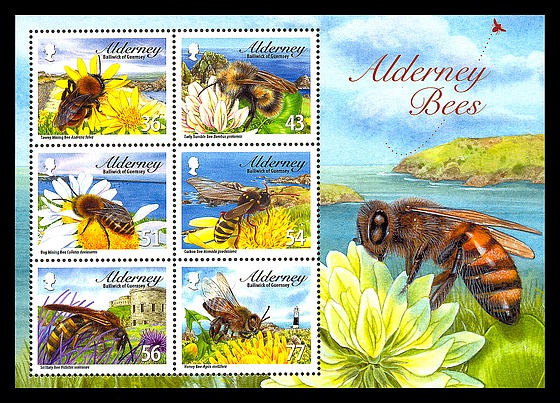British scientists have shot down a study on declining honeybee populations that triggered a French ban on a pesticide (Cruiser) made by Swiss agrochemicals group Syngenta (article attached). France's farm minister Stephane Le Foll withdrew Syngenta's marketing permit for the pesticide Cruiser OSR in June, citing evidence of a threat to the country's bees. But a study by Britain's Food and Environment Agency with the University of Exeter says the results of the original research were flawed. The French newspaper Le Monde reported that the laboratory of lead author James Cresswell (University of Exeter) is supported by Syngenta, the producer of Cruiser. Reliable sources report that James Cresswell received £136,000 directly from Syngenta within the past few months. Cresswell did not declare a conflict of interests.
The study, published in the journal Science, does not deny that pesticides could be harmful to individual bees but argues there is no evidence they cause the collapse of whole colonies. “We do not yet have definitive evidence of the impact of these insecticides on honeybees and we should not be making any decisions on changes to policy on their use,” said James Cresswell, the ecotoxicologist who led the latest study. The previous research, led by French scientist Mikaël Henry and published in Science in April, showed the death rate of bees increased when they drank nectar laced with the neonicotinoid pesticide, thiamethoxam, the active ingredient in Cruiser OSR. Henry's work calculated this would cause a bee colony to collapse completely but Cresswell said the French study seems to have used an inappropriately low birth rate, underestimating the rate at which colonies can recover from the loss of bees. “They modelled a colony that isn't increasing in size and what we know is that in springtime when oilseed rape is blossoming they increase rapidly,” Cresswell told Reuters. The French study has been cited by scientists, environmentalists and policy-makers as evidence of the impact of these pesticides on bees, which are declining around the world. “We know that neonicotinoids affect honeybees, but there is no evidence that they could cause colony collapse,” said Cresswell. “When we repeated the previous calculation with a realistic birth rate, the risk of colony collapse under pesticide exposure disappeared.” The Dutch toxicologist Henk Tennekes inferred that James Cresswell and Helen Thompson have not considered the results of Judy Wu's study, which demonstrated delayed worker bee development from pesticide residue exposure from contaminated brood comb. They should have. Mikaël Henry's data represent a worst-case scenario that may indeed occur under field conditions, says Tennekes. The French newspaper Le Monde reported that the laboratory of James Cresswell (University of Exeter) is supported by Syngenta, the producer of Cruiser. Reliable sources report that James Cresswell received £136,000 directly from Syngenta within the past few months. Cresswell did not declare a conflict of interests.
Source: Iol.co.za & The Independent, 21 September 2012
http://www.iol.co.za/scitech/science/environment/honeybee-homicide-case…
Read more at: http://phys.org/news/2012-09-pesticides-proven-guilty-honeybee-declines…

- Login om te reageren

James Cresswell and Helen Thompson did not consider Wu's study
A study by Judy Wu et al. demonstrated sub-lethal effects on worker honey bees from pesticide residue exposure from contaminated brood comb. These sub-lethal effects included delayed larval development and adult emergence or shortened adult longevity, which can have indirect effects on the colony such as premature shifts in hive roles and foraging activity. In addition, longer development time for bees may provide a reproductive advantage for parasitic Varroa destructor mites. James Cresswell and Helen Thompson did not consider Wu's study. They should have. It seems to me that Henry's data represent a worst-case scenario that may indeed occur under field conditions.
Source: Wu JY, Anelli CM, Sheppard WS (2011) Sub-Lethal Effects of Pesticide Residues in Brood Comb on Worker Honey Bee (Apis mellifera) Development and Longevity. PLoS ONE 6(2): e14720. doi:10.1371/journal.pone.0014720 (attached)
Response of Henry et al.:
http://comments.sciencemag.org/content/10.1126/science.1224930
James Cresswell should have declared a conflict of interest
In 1962, at the Women's National Press Club, Rachel Carson denounced the links that had been established between science and industry. "When a scientific organisation speaks," she asked, "whose voice do we hear – that of science or of the sustaining industry?" The question remains as pertinent today as it did in 1962. The French newspaper Le Monde reported that the laboratory of James Cresswell (University of Exeter) is supported by Syngenta , the producer of Cruiser. Reliable sources report that James Cresswell received £136,000 directly from Syngenta within the past few months. It seems to me that James Cresswell should have declared a conflict of interest. Sources:
http://www.lemonde.fr/planete/article/2012/09/23/le-chercheur-l-agrochi…
http://www.farmlandbirds.net/fr/content/rachel-carson-1962-when-scienti…